Vitamin E For Skin: Benefits, How To Use It, & More
Vitamin E For Skin: Benefits, How To Use It, & More
Among popular topical antioxidants, Vitamin E is the nutrient that acts almost like a protective cushion for the skin. Vitamin E is a fat-soluble antioxidant that supports the body’s immune system, cellular function and skin health. It contains humectant and emollient properties, meaning the nutrient both attracts and locks moisture into the skin. Along with its hydrating benefits, vitamin E offers skin-brightening effects (reduces hyperpigmentation and scars) and contains anti-inflammatory properties to strengthen the skin barrier, which helps relieve eczema symptoms and protect against UV-ray-induced sun damage.
Expert Tip: Both Zensa Numbing Cream and Zensa Healing Cream contain sources of topical Vitamin E to provide anti-inflammatory benefits to broken skin and support the wound-healing process during the tattoo after-care and permanent makeup (e.g. microblading and lip blushing) healing stages or to treat for chronic skin concerns like eczema or acne scarring.
Read on to learn more about the benefits of vitamin E, how to use vitamin E for your skin, the best & worst ingredients to combine with vitamin E, natural sources of vitamin E and how to shop for skincare products containing this hydrating antioxidant.

What is Vitamin E?
Vitamin E is a group of eight fat-soluble compounds, often referred to as a singular nutrient that contains powerful antioxidant properties. Alpha-tocopherol is the primary type found in skincare products and is one of the eight compounds that best meet human dietary requirements. It is stored in your skin’s sebum (oil production glands) and helps support several bodily systems (brain, liver, immune system functionality; heart, vision and reproductive health) and skin health. One of vitamin E’s most important benefits stems from its antioxidant effects: It protects against oxidative stress by neutralizing free radicals that could otherwise cause cellular damage.
As an essential vitamin, humans must include vitamin E in their diet to meet their nutritional needs. If necessary, vitamin E capsules or supplements can be taken daily to ensure you meet your dietary requirements. Topical vitamin E penetrates and absorbs into the top two layers of the skin (epidermis and dermis) to relieve dry, itchy skin, reduce inflammation and help your skin appear more youthful. Use a vitamin E oil or a plant extract that is in vitamin E (e.g. sunflower seed oil) to see results and improved skin health starting after around 2-4 weeks.
Benefits of Vitamin E For Skin
-
Improves Skin Hydration
-
Strengthens Skin Barrier
-
Relieves Symptoms of Chronic Skin Conditions (e.g.Eczema, Psoriasis, & Rosacea)
-
Fights Acne
-
Reduces Hyperpigmentation (e.g. Acne Scars, Burns, & Sun Spots)
-
Protects Against UV Rays & Sun Damage
-
Prevents Signs of Skin Aging
-
Promotes Wound Healing
Vitamin E stands out among other antioxidants for its moisturizing benefits. Some near-immediate benefits of using topical vitamin E for your skin include increased hydration, reduced skin dryness, a more even skin tone, improvements in skin texture and a generally smoother, softer complexion. Over time, consistently using vitamin E on your skin can reduce hyperpigmentation from acne scars or sunspots, prevent dry, itchy skin, relieve eczema flare-ups or those from similar inflammatory conditions, shield your complexion from future sun damage and provide overall anti-aging benefits for the skin.
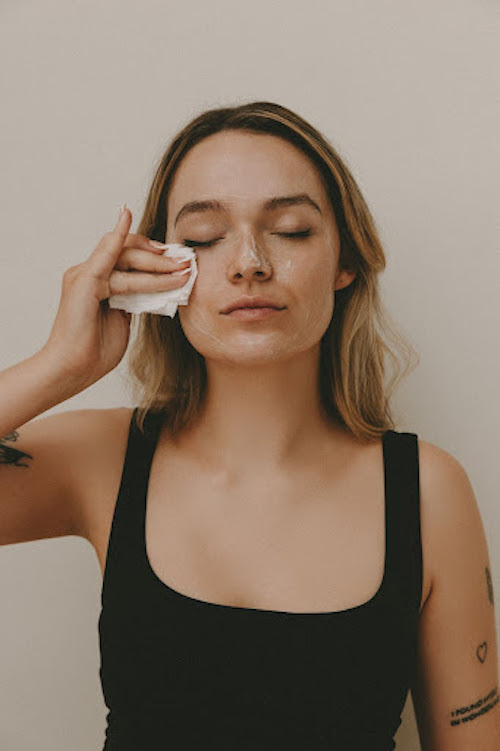
Improves Skin Hydration
Vitamin E’s humectant and emollient properties draw in water and seal this moisture, respectively, into the stratum corneum (skin barrier). The humectant properties of vitamin E attract water into the skin to offer immediate hydration, while its emollient qualities help prevent transepidermal water loss (TEWL) – a scientific way of saying moisture or water loss from the epidermis. These benefits of Vitamin E allow the nutrient to function as a moisturizer to heal or prevent dry skin, flaky patches and cracked skin.
Strengthens Skin Barrier
This moisture-retaining antioxidant offers several benefits to strengthen the skin barrier. Vitamin E’s skin-hydrating properties preserve moisture retention between your skin cells to prevent TEWL and weakened skin barrier functioning. Like any antioxidant, vitamin E reduces inflammation and encourages cellular turnover. Vitamin E’s antioxidant effects soothe any skin irritation, remove dead skin cells, increase collagen and elastin production and repair damaged tissue with a new layer of healthy skin cells.
Relieves Symptoms of Chronic Skin Conditions
A strong skin barrier is essential to manage eczema, psoriasis and rosacea flare-ups or any type of chronic inflammatory skin condition. Vitamin E helps soothe any redness, inflammation, cracked skin, dryness or thick skin associated with these skin disorders. The antioxidant restores the moisture lacking in between the cells to prevent skin dryness and increases collagen production, which improves skin barrier function to prevent outside irritants from infiltrating the skin (two main causes of eczema flare-ups).
Fights Acne
As an antioxidant, Vitamin E accelerates cellular turnover. This process helps remove dead skin cells, dirt or oil before they clog your pores. Clogged pores are a common cause of non-inflammatory acne (whiteheads or blackheads) and inflammatory acne (cysts, pustules and nodules). Vitamin E’s anti-inflammatory properties can help calm the redness, swelling and soreness commonly associated with inflammatory acne. This decrease in swelling can also lower your chances of developing (severe) acne scars, a type of post-inflammatory hyperpigmentation, once your breakout has cleared.
While no study definitively confirms vitamin E’s ability to clear acne up on its own, there is evidence to show that combining Vitamin E with topical Vitamin A, zinc or applying it before benzoyl peroxide has an acne-fighting effect.
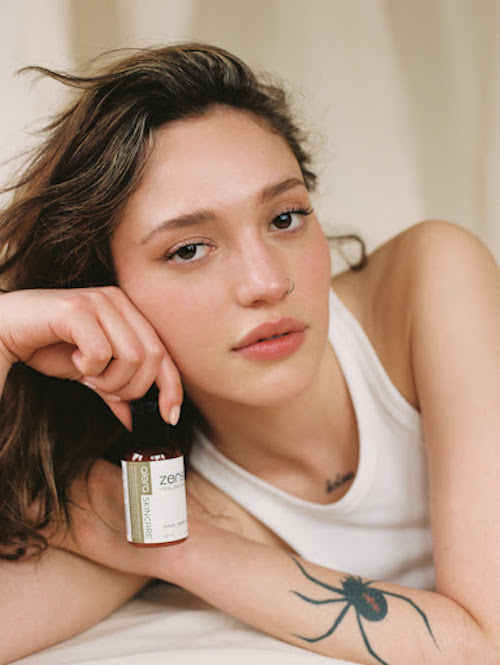
Reduces Hyperpigmentation
Vitamin E is known for its skin-brightening effects and ability to fade dark spots (especially when combined with vitamin C). Its antioxidant properties stimulate cellular turnover to help break up melanin clusters and resurface your skin for a more even-toned complexion. Vitamin E can suppress the activity of tyrosinase, the enzyme responsible for melanin production, to reduce the formation of dark spots. The antioxidant also can prevent the darkening of the skin that results from oxidative stress and free radicals in the body. Vitamin E is often used to minimize scarring and, when combined with vitamin C, can protect against UV-ray-induced sun damage and resulting hyperpigmentation.
Protects Against UV Rays & Sun Damage
One of the main benefits of vitamin E is its ability to protect your skin against harmful UVB rays and the effects of sun damage on your complexion. Vitamin E neutralizes free radicals and reduces oxidative stress. The antioxidant can absorb some of the UVB rays from the sun to form a protective shield around your cells to prevent (or even reverse) hyperpigmentation, dry skin, wrinkles or other signs of rough skin texture or aging skin. It is important to stress that Vitamin E only protects against UVB rays (damage the top layers of the skin) not UVA rays (affect the deeper layers of the skin). So, in addition to sunscreen (apply one with at least SPF 30 daily), use Vitamin E with another antioxidant like Vitamin C (protects against both UVA and UVB rays) to enhance the fat-soluble ingredients’ protective and skin-brightening benefits.
Prevents Signs of Skin Aging
Vitamin E has all of the elements of the perfect anti-aging ingredient to maintain a healthy, youthful glow. It is hydrating and prevents transepidermal water loss to keep your skin moisturized, soft and supple. As an antioxidant, Vitamin E promotes collagen and elastin production while accelerating cellular turnover to prevent the formation of wrinkles and fine lines. The nutrient’s free radical-neutralizing properties protect the skin from oxidative stress, which helps fade dark spots and acne scars, prevent future sun spots and post-inflammatory hyperpigmentation and decrease skin wrinkling, dryness, dullness and sagging.
Promotes Wound Healing
This fat-soluble antioxidant protects your cells and shields them from further free-radical damage. Topical forms of vitamin E are beneficial for wound healing because they combat oxidative stress in their tracks and provide UVB-ray protection to prevent future cell and sun damage (which can lead to scarring). While researchers are still waiting to find a direct correlation between vitamin E and wound healing, we know that vitamin E’s anti-inflammatory properties help reduce inflammation, strengthen the moisture barrier and protect against cell damage to support the skin repair process and minimize scarring. A small 2004 study conducted with lambs found that vitamin E-rich sunflower seed oil (a key ingredient in Zensa Healing Cream) accelerated the wound-healing process among the 18 lambs observed.
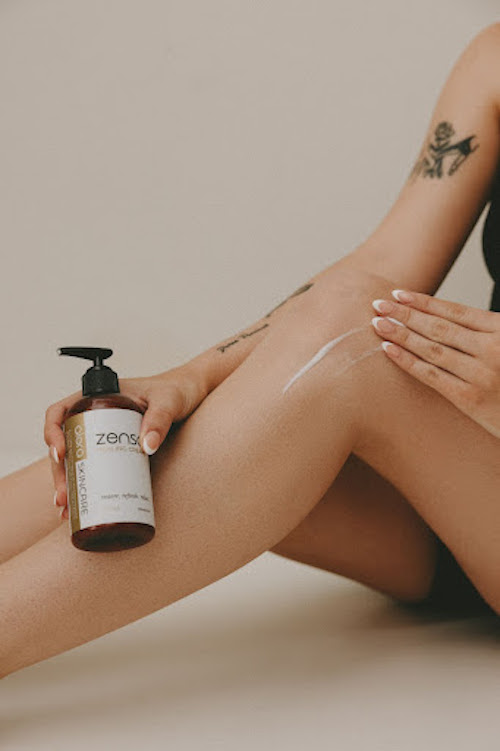
Benefits of Vitamin E For Tattoo After-Care & Healing
-
Soothes Inflammation: Vitamin E reduces inflammation to support cellular turnover (accelerating the wound-healing process). This benefit of vitamin E protects against cellular damage to minimize scarring, premature fading or ink patchiness during the tattoo healing stages.
-
Prevents Dry, Itchy Skin: Vitamin E nourishes the moisture barrier and hydrates the skin. It locks in moisture to jumpstart the skin repair process after getting a tattoo, a process that temporarily weakens the skin barrier. Nourishing tattoo preparation products, like Zensa Numbing Cream, support the initial healing stages before the tattooing process even begins. Zensa Numbing Cream contains vitamin E to prevent inflammation, irritation and cracked, dry skin – all common side effects from getting a tattoo. Our unique formula does not contain vasoconstrictors and can be reapplied on broken skin.
-
Brightens Tattoo Ink: Vitamin E supports a well-hydrated skin barrier, healthy cellular turnover and prevents cell damage during the tattoo healing process. These benefits of Vitamin E help remove excess ink from the dermis, seal dry patches and keep your cells healthy to increase your tattoo ink’s vibrancy. Zensa Healing Cream contains vitamin E-rich sunflower seed oil to help brighten fresh, relatively new or old tattoos.
-
Protects Against UV Damage: Keeping a fresh tattoo out of the sun is essential to ensure the fresh wound heals. Once the initial tattoo healing stages are over, tattoos require adequate protection against the sun’s UV rays to prevent ink fading. Use a product like Zensa Healing Cream, which combines antioxidants like vitamin E (and C) to safeguard your tattoo over time. Pair it with your chosen sunscreen.

How To Use Vitamin E For Skin
Vitamin E can be used in its purest form, such as a store-bought vitamin E oil or liquid from inside a vitamin E capsule. While these concentrated forms of vitamin E can have a hydrating and anti-aging effect, they are not ideal for sensitive skin as they can clog pores or irritate the skin. Vitamin E serums or moisturizers are a great option and can be found mixed with vitamin C, ferulic acid, hyaluronic acid or retinol to boost the benefits of vitamin E for the skin.
Use vitamin E serums or moisturizers (like Zensa Healing Cream) once or twice a day as a foundational component of either your morning or nighttime routine. Here’s a guide to help you build a skincare routine that’s best for your skin type and concerns (and step-by-step instructions for using your products in the correct order).
Dos & Don’ts: What To Mix With Vitamin E
What To Skincare Ingredients to Mix with Vitamin E:
-
Vitamin E + Vitamin C
-
Vitamin E + Vitamin C + Ferulic Acid
-
Vitamin E + Aloe Vera
-
Vitamin E + Niacinamide
-
Vitamin E + Hyaluronic Acid
-
Vitamin E + Vitamin C+ Hyaluronic Acid
-
Vitamin E + Sunscreen
Vitamin E + Vitamin C: Mixing vitamin E and vitamin C together is a tried-and-true combination for protection against UV rays and sun damage. Vitamin E and vitamin C enhance each other’s ability to neutralize free radicals and offer more comprehensive protection against sun damage (Vitamin E only protects against UVB rays while vitamin C protects against UVA rays, too) than either ingredient alone.
Zensa Healing Cream contains several natural ingredients that are rich in vitamins C and/or E, including grapefruit essential oil, aloe vera, sunflower seed oil, avocado oil and cucumber extract, among others. These powerful antioxidants work together to reduce irritation, minimize scarring, soothe and hydrate the skin while nourishing the skin barrier to decrease inflammation, manage conditions like eczema and speed up wound healing.
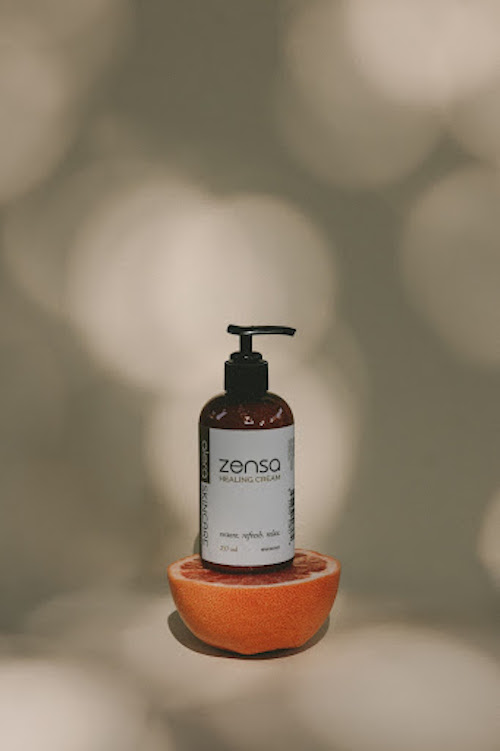
Vitamin E + Vitamin C + Ferulic Acid: Mixing ferulic acid enhances the protective qualities of vitamin E and vitamin C to offer a triple threat to prevent long-term sun damage to your skin. A 2005 study confirmed that adding ferulic acid to this already powerful antioxidant duo can offer up to double the photoprotection (ability to protect against sun damage) than a combination of vitamin E and C alone.
Vitamin E + Aloe Vera: This skin-soothing combination helps to moisturize the skin, reduce inflammation and accelerate wound healing. Vitamin E and aloe vera can be mixed together to treat dry skin or relieve symptoms of chronic skin conditions like eczema, rosacea or psoriasis. A 2014 study found that combining vitamin E and aloe vera could also be an innovative natural remedy for the treatment of burns and play a significant role in supporting the wound-healing process. Both skincare ingredients are known for their skin-brightening effects and protective benefits against UV rays. When mixed, vitamin E and aloe vera create a powerful combination to use as a natural treatment option for reducing (or preventing) hyperpigmentation.
Vitamin E + Niacinamide: Mixing these two ingredients together can enhance each vitamin’s anti-inflammatory, hydrating and anti-aging benefits for your skin. Like vitamin E, niacinamide reduces inflammation, lightens dark spots (hyperpigmentation) and helps strengthen the skin barrier. Niacinamide e (vitamin B3) encourages ceramide protection to enhance your skin’s lipid barrier to help your skin retain moisture while increasing collagen production to reduce fine lines and wrinkles. Vitamin B3 regulates oil production, minimizes pore size and can help treat inflammatory acne, it can potentially mitigate one of the common side effects of using vitamin E – clogged pores. While vitamin E and niacinamide are a favorable duo, their best qualities can also be enhanced by adding vitamin C to your routine for a boost in sun protection and anti-aging benefits.
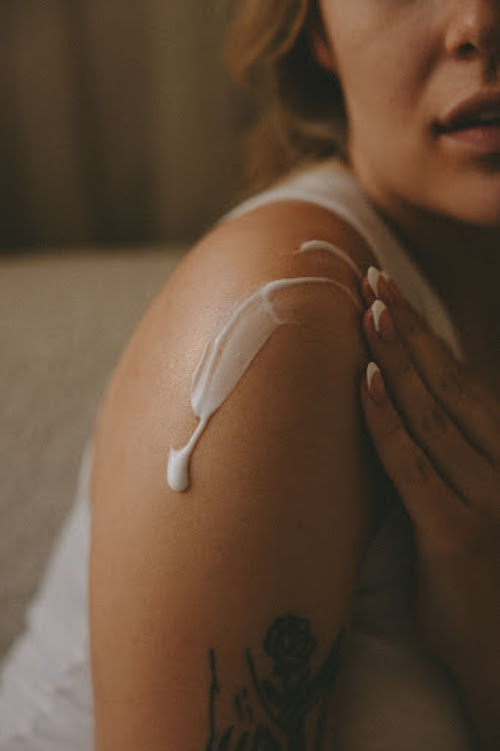
Vitamin E + Hyaluronic Acid: This combination provides an ultra-moisturizing boost to your skincare routine. Hyaluronic acid is a humectant, known for its hydrating and skin-smoothing properties. Topical vitamin E is a highly moisturizing ingredient that pairs well together with hyaluronic acid to strengthen the skin barrier and reduce inflammation or dryness associated with eczema, psoriasis or similar skin conditions. Mixing vitamin E and hyaluronic acid offers anti-aging benefits for the skin that include reducing or preventing hyperpigmentation (vitamin E) and promoting collagen production and skin elasticity (hyaluronic acid).
Vitamin E + Vitamin C + Hyaluronic Acid: This ingredient trio offers a triple threat against sun damage, signs of aging and dry skin. When it comes to anti-aging skincare: Vitamin E and vitamin C are a perfect match to prevent UV ray damage, sun spots and hyperpigmentation. Adding hyaluronic acid to this antioxidant duo mitigates any irritation caused by vitamin C, boosts hydration, increases skin elasticity and pairs well with vitamin E to trap moisture and strengthen the skin barrier for fewer wrinkles, eczema flare-ups or signs of dry, itchy skin.
Vitamin E + Sunscreen: While vitamin E offers some protection against UVB rays, using vitamin E is always a helpful addition to – never a replacement for – proper sunscreen, even when combined with vitamin C. Apply sunscreen with at least SPF 30 every morning. Layer products with vitamin E and vitamin C to enhance your skin’s defenses against potential sun damage.
What Skincare Ingredients Not to Mix with Vitamin E:
While you can mix vitamin E with nearly any skincare ingredient, certain combinations might be undesirable if you generally combine vitamin E with its ideal complement – vitamin C. If you’re combining vitamin E and vitamin C in either your morning or nighttime skincare routine, avoid mixing these ingredients with vitamin E:
-
Alpha Hydroxy Acids (AHAs): Lactic Acid, Malic Acid, Glycolic Acid, Citric Acid, Tartaric Acid
-
Beta Hydroxy Acids (BHAs): Tropic Acid, Betaine Salicylate, Salix Acid
-
Benzoyl Peroxide
-
Retinol (or other Vitamin A-Derivatives)
Mixing ingredients like AHAs, BHAs, Benzoyl Peroxide or Retinol with vitamin E (especially when combined with vitamin C) can overwhelm the moisture barrier. These skincare ingredient combinations can lead to inflammation, dry, itchy skin, redness or irritation – especially if you have sensitive skin.
Natural Sources of Vitamin E
Topical Sources of Vitamin E for Skin:
-
Almond Oil
-
Aloe Vera
-
Avocado Oil
-
Colloidal Oatmeal
-
Hazelnut Oil
-
Sunflower Seed Oil
-
Shea Butter
Zensa Healing Cream contains vitamin E-rich ingredients like sunflower seed oil, avocado oil, aloe vera and shea butter to soothe and hydrate the skin, reduce inflammation and minimize scarring from sun exposure, acne or other causes of post-inflammatory hyperpigmentation. Our formula combines these vitamin E-rich ingredients with medicinal-grade calendula oil and grapefruit seed oil (packed with vitamin C) to soothe symptoms of chronic skin conditions like eczema and accelerate the wound-healing process. The sunflower seed oil helps brighten your tattoo ink and preserves its original colour without impeding ink settling – making Zensa Healing Cream the ideal tattoo lotion to use during the tattoo after-care process.
Food Sources of Vitamin E for Skin:
-
Sunflower Seeds
-
Almonds
-
Avocados
-
Spinach
-
Butternut Squash
-
Kiwi Fruit
-
Peanuts
-
Swiss Chard
-
Broccoli
How To Shop For Vitamin E Skincare Products
Always look for vitamin E skincare products that contain alpha-tocopherol (the purest form of vitamin E that is best absorbed by the skin and body). Ensure the products you buy contain 100% vitamin E oil without any additives or fillers. Look for serums or moisturizers that combine vitamin E with vitamin C to enhance each other’s antioxidant benefits for the skin. Products like Zensa Healing Cream combine vitamin E and vitamin C-rich ingredients, including medicinal-grade calendula oil and grapefruit seed oil with sunflower seed oil, aloe vera, avocado oil, shea butter and more for reduced inflammation, accelerated wound healing and calmer, healthier and clearer skin.
